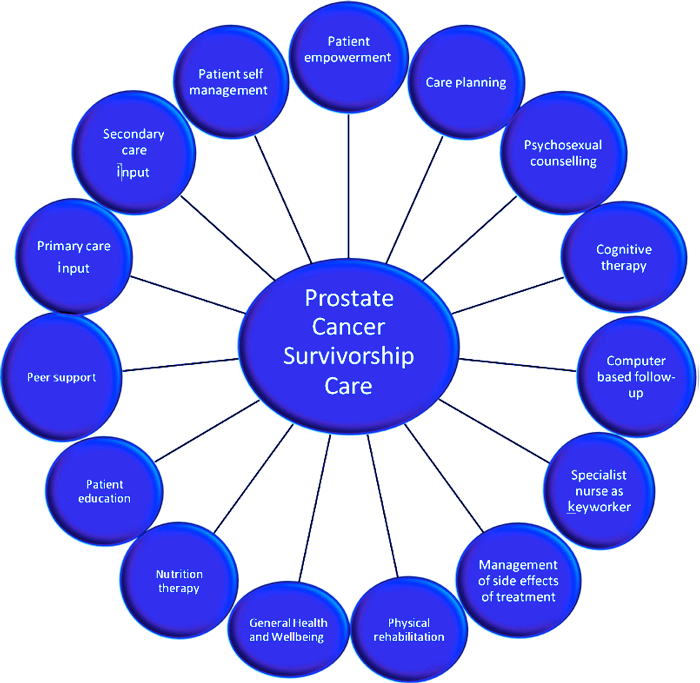Over two million people in England have a diagnosis of cancer [1]. Of this figure, over 250,000 have been diagnosed with prostate cancer [2]. However, during the next decade, a rapid increase in the number of new cancer diagnoses, as well as a growing number of cancer survivors, is predicted [3].
This increase in cancer prevalence results from improved earlier detection, and improved treatment leading to an attendant decrease in cancer-related mortality. Yet few studies or guidelines address the broader, multifaceted aspects of cancer survivorship, including self-responsibility and patient empowerment, where appropriate.
Survivorship is defined by Macmillan Cancer Support, a leading UK cancer care and support charity, as someone who has completed initial cancer management with no evidence of apparent disease. Prostate cancer survivors require further investigation as there are concerns that current follow-up methods are unsuitable [4], due to an increase in the number of survivors. The defined landmarks for survivorship care include monitoring for recurrence, metastases, side-effects of treatment and co-ordination between primary and secondary care.
“It aims to address the holistic needs of the survivorship cohort and at the same time allow monitoring for acute recurrence and community-based follow-up and patient support.”
The National Cancer Survivorship Initiative (NCSI) highlighted key shifts in attitude towards care [5]. The focus is now more on recovery and return to work. This includes a personalised approach to individual risk assessment and patient self-management. As a result of this, five key phases to survivorship care were identified:
- Care via primary treatment from diagnosis
- Enable as rapid and full a recovery as possible
- Ensure recovery is sustained
- Manage side-effects of treatment
- Monitor for recurrence or disease progression
Worldwide, there is conflicting evidence regarding follow-up of this cohort, especially over the value of follow-up once cured and in the survivorship phase. We propose a follow-up programme with a more holistic approach empowering patients to take responsibility for their own clinical assessment, whilst at the same time, keeping them under the clinical governance umbrella of secondary care in the community, allowing local treatable recurrence to be detected early.
Unmet patient needs
Current on prostate cancer survivorship cover a range of topics.
These include symtoms such as physical limitations, cognitive limitations, depression / anxiety, sleep problems, fatigue, pain, and sexual dysfunction [6]. Exercise was found to produce many beneficial effects in the cancer population including improvements in physical function, quality of life (QoL), body weight, functional capacity; and decreased levels of anxiety, fatigue, and depression. Another review indicates exercise interventions are safe, resulting in improvements in physical fitness, QoL, fatigue levels, and psychosocial outcomes [7]. Physical activity guidelines for cancer survivors suggest that physical activity should be an integral and continuous part of care for all cancer survivors [8]. This highlighted that future studies should focus on identifying clinical, personal, physical, psychosocial, and interventional aspects of survivorship. Diet is also an important area for intervention in the survivorship cohort and can be used along with exercise to improve health and wellbeing of cancer survivors.
Reviews have examined interactions and communication between families. Couples, regardless of gender, who are survivors of prostate cancer face a number of challenges and opportunities that impact upon their health, QoL, communication, and overall relationship satisfaction [9]. In addition, reviews have also highlighted self-management as a method of providing healthcare solutions to ameliorate men’s functional and emotional problems [10].
Based on these findings, requirements for prostate cancer survivorship care were drawn up, and a new programme based on these results (Figure 1).
Figure 1: Requirements of Prostate Cancer Survivorship Care.
A new model of survivorship care
As part of a National Cancer Survivorship Initiative, a recovery package was developed. This includes holistic needs assessments and care planning at key points of the care pathway, a treatment summary, a cancer care review, a patient education and support event. This programme was initially devised when it was identified that specific areas of care were lacking in this cohort, when followed up on a clinic basis. It aims to address the holistic needs of the survivorship cohort and at the same time allow monitoring for acute recurrence and community-based follow-up and patient support.
Our survivorship programme is for patients following curative therapy for organ confined disease (surgery, external beam radiotherapy or brachytherapy). Patients are offered the option of entering into the survivorship programme and discharged from clinic. Inclusion criteria specify:
- Patients must be two years post radical prostatectomy with an unrecordable PSA; or
- Three years post radiotherapy or brachytherapy with a stable PSA
We currently have over 500 patients on this programme. The patients’ demographic, disease and treatment details are entered onto a password-protected web-based database. The IT programme allows patients to be monitored for recurrence via automatic extraction of PSA results from the bespoke hospital database. Alerts are automatically generated if the PSA is above a previously set range. The clinical nurse specialist (CNS) running the programme will contact the responsible consultant once an alert is generated and the patient reviewed in clinic, if required. The CNS will also go through a ‘distress thermometer’ with patients on admission to the programme, to identify areas where the patient needs support, whether it is psychological, physical, social, etc. The specialist nurse would act as the patient’s key worker, should they develop any side-effects of treatment, or any indication of cancer recurrence.
“The CNS will also go through a ‘distress thermometer’ with patients.”
Conclusion
We have developed a community-based survivorship follow-up scheme for prostate cancer patients based on risk stratification and principles of personalised patient care, which reflects a key shift in culture. The aim of this programme is to provide a better standard of care for patients whilst bringing savings to the NHS that may be applied across other centres and for other cancer management programmes. Whilst this programme is currently only for patients following curative treatment for prostate cancer, the next step forward is to see if patients undergoing active surveillance or on hormone therapy can be followed up using this programme.
References
1. Department of Health. National Cancer Survivorship Initiative. London, UK; Department of Health; 2008.
2. Maddams J, Brewster D, Gavin A, et al. Cancer prevalence in the United Kingdom: estimates for 2008. Br J Cancer 2009;101(3):541-7.
3. Ganz PA. Survivorship: adult cancer survivors. Prim Care 2009;36(4):721-41.
4. National Cancer Intelligence Network UK. Lifetime prevalence for all cancers and colorectal, lung, breast and prostate cancers. 2008
http://www.ncin.org.uk/publications/
reports/reports_archive
Last accessed May 2015.
5. Giarelli E. A model of survivorship in cancer genetic care. Semin Oncol Nurs 2004;20(3):196-202.
6. Harrington C, Hansen J, Moskowitz MT, et al. It’s not over when it’s over: Long-term symptoms in cancer survivors: A systematic review. International Journal of Psychiatry in Medicine 2010;40(2):163-81.
7. Courneya KS, Sellar CM, Stevinson C, et al. Moderator effects in a randomized controlled trial of exercise training in lymphoma patients. Cancer Epidemiol Biomarkers Prev 2009;18(10):2600-7.
8. Buffart LM, Galvão DA, Brug J, et al. Evidence-based physical activity guidelines for cancer survivors: Current guidelines, knowledge gaps and future research directions. Cancer Treatment Reviews 2014;40:327-40.
9. Galbraith ME, Fink R, Wilkins GG. Couples surviving prostate cancer: challenges in their lives and relationships. Semin Oncol Nurs 2011;27(4):300-8.
10. Cockle-Hearne J, Faithfull S. Self-management for men surviving prostate cancer: a review of behavioural and psychosocial interventions to understand what strategies can work, for whom and in what circumstances. Psychooncology 2010;19(9):909-22.
11. Husson O, Mols F, van de Poll-Franse LV. The relation between information provision and health-related quality of life, anxiety and depression among cancer survivors: a systematic review. Ann Oncol 2011;22(4):761-72.
Declaration of competing interests: None declared.






